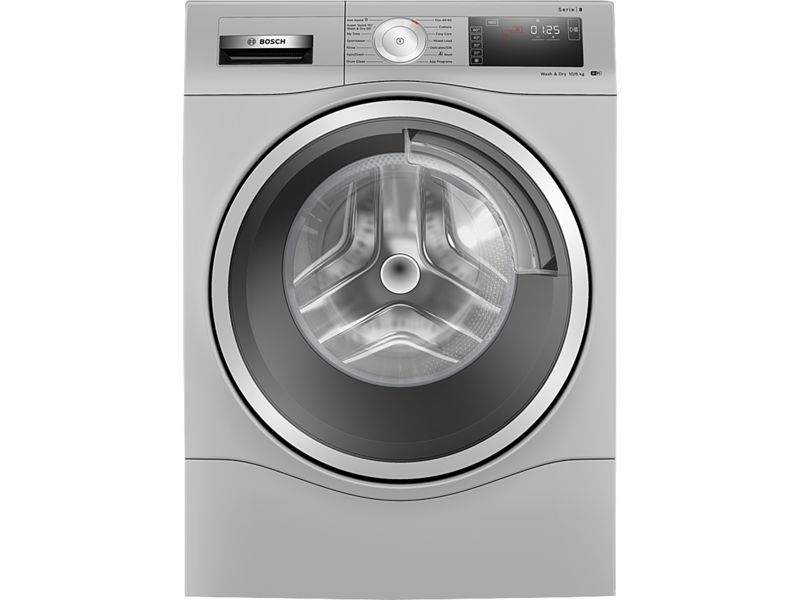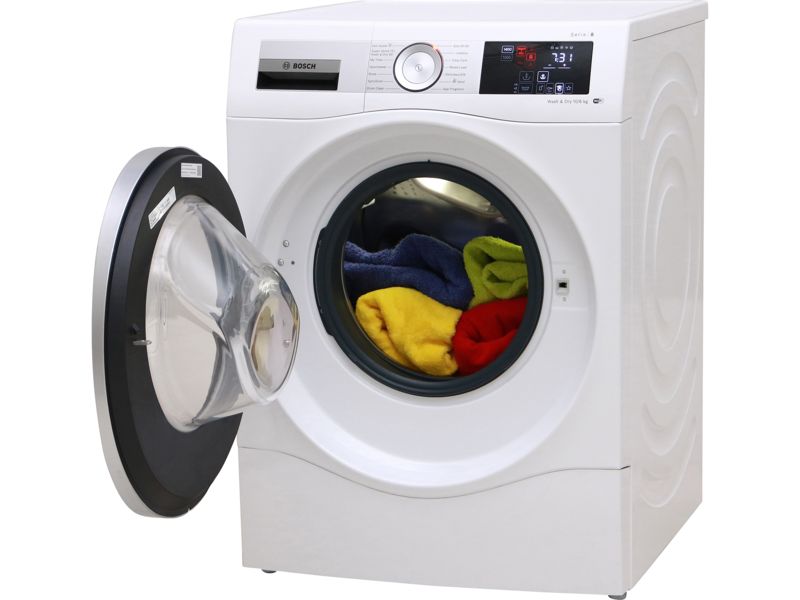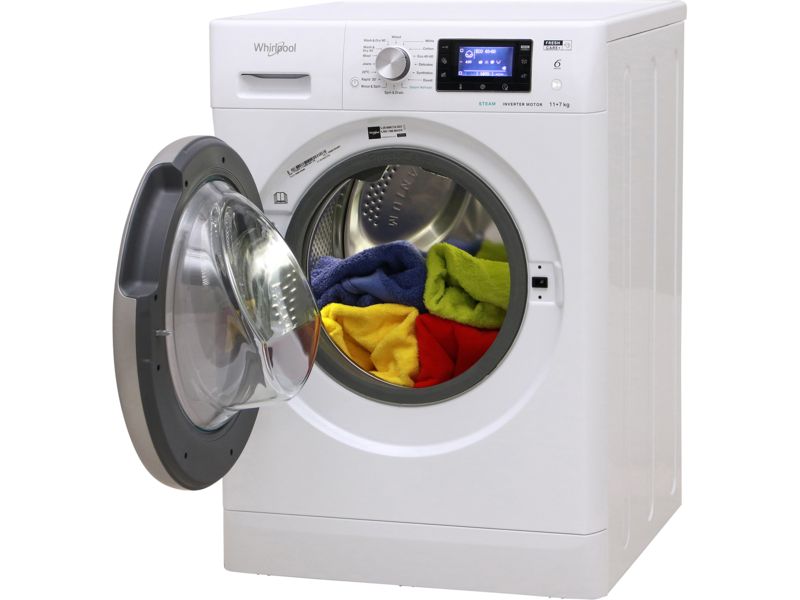How we test washer-dryers

Each washer-dryer rated in our washer dryer reviews has been put through a series of independent tests in the Which? test labs.
We wash and dry more than 1,300kg of laundry a year in our rigorous tests so you can be sure the ones we recommend really do live up to their claims.
Our reviews answer your most crucial questions about washer-dryers.
See our best washer-dryers to find out which models give top-class results.
What are Which? Best Buys and Don't Buys?

Best Buys are awarded to washer-dryers that impress us most in our tests. A washer-dryer scoring more than 70% will be a Best Buy and comes with a firm recommendation. Meanwhile, washer-dryers that score less than 45% are Don’t Buys.
- Best Buy washer-dryers tick the most important boxes – outstanding stain removal from cottons and manmade fibres, quick, accurate and even drying and easy to use.
- Don’t Buy washer-dryers tend to fall down in the most important areas – ineffective stain removal, very slow drying and detergent is left on clothes after the rinse.
To find out which models are Best Buys, head to our washer-dryers reviews and use the Best Buy filter.
What is a Which? Eco Buy washer-dryer?

If your washer-dryer is due an upgrade and you're trying to make more eco-friendly choices, be sure to look out for our Eco Buy models.
Eco Buy washer-dryers will have a lower environmental impact over their lifetimes compared to other models we've tested.
We use two methods to calculate this: how energy-efficient they are and how little water they use. Because of this, you can expect an Eco Buy washer-dryer to save you money on your bills as well as reduce your environmental impact.
To be an Eco Buy, a washer-dryer must have:
- A test score of at least 65%
- Four stars or more for water use
- Four stars or more for energy use during washing
- Three stars or more for drying performance on both cottons and synthetics
- A good brand reliability record in our annual washer-dryer owner survey
Only around 5-10% of washer-dryers are sustainable enough to be Eco Buys. To find out which did enough in our tests to earn this badge, head to our washer-dryer reviews and use the Eco Buy filter.
How is the Which? score calculated
The Which? overall score is a percentage. The score only takes into account the results of our tests and ignores price completely. This means that all washer-dryers are tested on exactly the same scale, so you can compare any washer-dryer at any price and know how it measures up against its rivals in key areas. All washer-dryers are tested in the same way, regardless of the manufacturers’ claims.
Weightings and star ratings
A Which? overall score is made up of dozens of individual tests, from key factors such as overall cleaning, rinsing efficiency and ease of use, to energy and water use.
Behind each of these ratings are dozens of measurements and checks. In the case of ease of use, we carry out more than 50 convenience assessments for each washer-dryer.
The most important aspects of a washer-dryer's performance, such as how well it cleans clothes, will more greatly impact its score than whether the instruction booklet is easy to understand or whether the drum is easy to load and unload.
To keep things simple, the most important scores are shown as star ratings out of five on each washer-dryer's Test Results page. This gives an easy-to-compare list of strengths and weaknesses, so you can quickly work out whether a washer-dryer is right for you.
How the overall test score is calculated
- 40% Washing, rinsing and spin drying (includes energy and water efficiency)
- 25% Wash and Dry programme (incl. energy/water efficiency)
- 15% Drying speed, evenness and accuracy (incl. energy/water efficiency)
- 15% Ease of use
- 5% Quietness
Our key testing criteria
Below are the key testing categories and how we evaluate each one:
Washer-dryer overall cleaning
Key question: How good is it at removing dirt and grime from clothes?
The best washer-dryers will leave your clothes sparkling clean and fresh, while the worst will make you wish you’d never pressed start.
To check how well a washer-dryer removes stains, we place a cloth splattered with chocolate, oil, blood and red wine marks in the drum, along with sheets and other dirty items of clothing.
We fill the drum with a mixed load that simulates the laundry of an everyday user, and test two wash programs three times over to ensure the accuracy of our results.
- 40°C cottons program We fill the drum to 80% capacity with samples of stained cloth and mixed clothing, including shirts, jeans and towels, to imitate how you would typically fill your washer-dryer.
- 40°C easy care/synthetics program Synthetics wash programs have a capacity of around half the maximum of the washer-dryer, so we load the drum to 50% capacity with a mixture of man-made fibres such as polyester.
After the wash, we measure how much light is reflected off the cloth using a machine called a spectrophotometer, which measures the intensity of reflected light. The more light reflected, the better the machine is at removing stains.
Washer-dryer rinse and spin dry
Key question: Does this washer-dryer rinse away all left-over detergent in the wash? And does the final spin leave laundry dry?
Detergent can be irritating to those with sensitive skin. To measure how well washer-dryers remove it during the rinsing cycle, we take freshly rinsed washing from the machine, just before the spin cycle, and spin it in a super-fast spin dryer.
After the spin, we collect water from the clothes and measure how alkaline it is compared with tap water. Detergent is very alkaline, so the greater the alkaline level, the poorer the machine is at rinsing.
We also weigh the clothes before and after the wash to calculate how much water is left in them after the final high-speed spin. A good washer-dryer won't leave clothes heavy and with plenty of water still in them - helping to reduce drying time, whether you dry them on the line or tumble dry them.
Washer-dryer overall tumble drying
Key question: Will this washer-dryer tumble dry quickly and evenly?
The best washer-dryers will handle drying your clothes just as well as washing them. Unfortunately, our tests have found that all-too-often washer-dryers are let down by their standard of drying.
We dry three loads of cottons and three loads of synthetics and rate the washer-dryers based on the standard and evenness of their drying.
Determining when clothes are ‘dry’ involves weighing them to see how much water they contain before and after the program. This can vary from 3% for a sheet to more than 20% for a pair of jeans or a towel.
The variation between the different items tells us both how well-dried the clothes are, as well as how even the drying is.
Your time is precious, too, which is why we record how long washer-dryers take to dry your clothes and take the times into account in our overall drying ratings.
Our tests have found huge variations in how quickly washer-dryers can get your clothes dried.
- The quickest dryers can take as little as 25 minutes per kilo.
- The slowest dryers take as much as 82 minutes per kilo.
This means that the quickest dryers will take roughly two and a half hours to dry a cottons load, and the slowest could take more than eight hours.
Washer-dryer ease of use
Key question: How easy is this washer-dryer to load, set and fill with detergent?
We evaluate every machine's design and controls to assess how easy it is to use. Examples of some features our experts look for are listed below:
- Indicator lights - We prefer large and bright lights that indicate when the filter needs cleaning, or a light inside the drum to assist with visibility when loading and unloading. Lights on the control panel should be accompanied by a clearly marked and self-explanatory label, which is visible from standing and sitting positions.
- Loading and removing washing - We look for a wide drum opening and a door with a wide porthole that doesn’t have a fiddly handle and which opens to 180 degrees. You should also be able to load it easily from a standing or sitting position.
- Detergent dispenser - This should be easy to open and close, with no sharp edges. It should require little force and dexterity to remove and replace for cleaning. It should also have clear labels to indicate which compartments are for detergent and fabric conditioner, and the maximum fill level.
- Buttons and dials - We look for clearly marked, well-spaced protruding buttons and dials, with descriptions that are self explanatory and easy to read. They should also be easy to grip and turn or activate. Touch-sensitive buttons should not be too responsive, as this can cause you to change your setting by accident as you brush past your washer-dryer.
Different sizes, textures and shapes, as well as noises that indicate a button has been successfully selected, are helpful to people with visual impairments.
Washer-dryer energy and water use
Key question: How much does a washer-dryer cost to run? Is it efficient compared to other washer-dryers?
Washer-dryers can be far from cheap to run due to their dual functions, so we measure exactly how much water and energy each washer-dryer uses at the Which? test lab. The lower the amount of energy a washer-dryer uses, the lower your energy bills.
A washer-dryer with a large 10kg-capacity drum will be tested in the same way as a machine that can only hold 6kg of clothes. The bigger machine is likely to use more energy and water than the smaller machine, so we divide the energy and water used by the capacity of the machine in kilos to evaluate our results fairly for each machine on test.
We use our analysis to calculate estimates of how much each washer-dryer will add to your energy bills each year, so you can compare models on running costs as well as the purchase price. To help you know whether the energy costs are high or low for the product, we also provide an energy-efficiency star rating in our reviews.
Washer-dryer noise
Key question: Is this washer-dryer too noisy to live with, particularly on the final spin?
We also measure how much noise the machine makes, since there's no way for you to tell this in the shop.
Some washer-dryers are so quiet you'd hardly know they're running, while others are so loud you'll need to move your conversation to the next room.
Pick the perfect washer-dryer with Which? reviews
There is a wide variety in the scores of washer-dryers in the same price bracket.
More-expensive washer-dryers tend to perform better, as you might expect, but we've found cheaper models that score higher than those that are much more expensive.
So check our washer-dryer reviews and look beyond the price tag when you’re shopping next.



